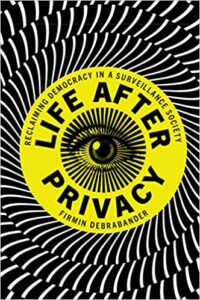 Reclaiming Democracy in a Surveillance Society
Reclaiming Democracy in a Surveillance Society
Life After Privacy, by Firmin DeBrabander, sets out to discuss privacy during the digital age in a new and innovative way. It is no secret that privacy is in jeopardy, and we, the digital citizens, are its principal threat, willingly surrendering it to gain access to new technology, and granting the government and corporations immense power over us. But what if we can protect our freedom without privacy?
Here, DeBrabander makes that case that privacy is actually a fairly new value that has not often been enjoyed throughout history. He contends that privacy is actually a poor foundation for democracy, that it is constantly persecuted, and it is politically and philosophically suspect. He argues that currently, the more important thing to focus on is the vitality of the public realm, something that is equally at risk during the digital age.
Reviews and endorsements of the publication include:
“Life After Privacy: Reclaiming Democracy in a Surveillance Society is an eloquent, compelling call for us to rethink our commitment to privacy by understanding its history and uses. Rather than attempting to double down on a possibly doomed principle, DeBrabander argues that what is really needed is more democracy, and specifically a newly energized commitment to a public sphere that requires open, transparent, and meaningful debate. An indispensable book for our times that does what great political philosophy needs to do – make us question what we mean by our most basic concepts.”—William Egginton, author of The Splintering of the American Mind
“In 2020, more so than in 1984, the Big Brother is watching you. But does this really matter? – asks Firmin DeBrabander’s pungent new book. Ranging from intellectual history to contemporary economics, from Big Data to Big Politics, from confession to contestation, Life After Privacy argues that we should finally begin caring for the public realm, rather than obsessing about intrusions into the private domain, which is something of a political fiction. If there is a work with the potential to reframe the very terms of the current debate on privacy, it is the one you are now holding in your hands!”—Michael Marder, author of Political Categories: Thinking Beyond Concepts
“This book makes accessible a counter-intuitive (perhaps even seemingly-contrarian) argument about privacy that deserves a hearing. Not all readers will agree with DeBrabander’s conclusion that privacy is pretty much dead. But this is a view murmured often enough in Silicon Valley to warrant serious attention. DeBrabander understands our skepticisms but skillfully argues that we are inexorably drawn to this conclusion nonetheless. Those who care deeply about privacy, as well as those who look forward to the transparent society, will learn much from this book’s subtle arguments. And remember: the best philosophy books are the ones that strike you as implausible by their title but leave you convinced after you’ve read them.”—Colin Koopman, author of How We Became Our Data
For more information on the publication, click here.
Firmin DeBrabander is professor of philosophy at the Maryland Institute College of Art in Baltimore.
